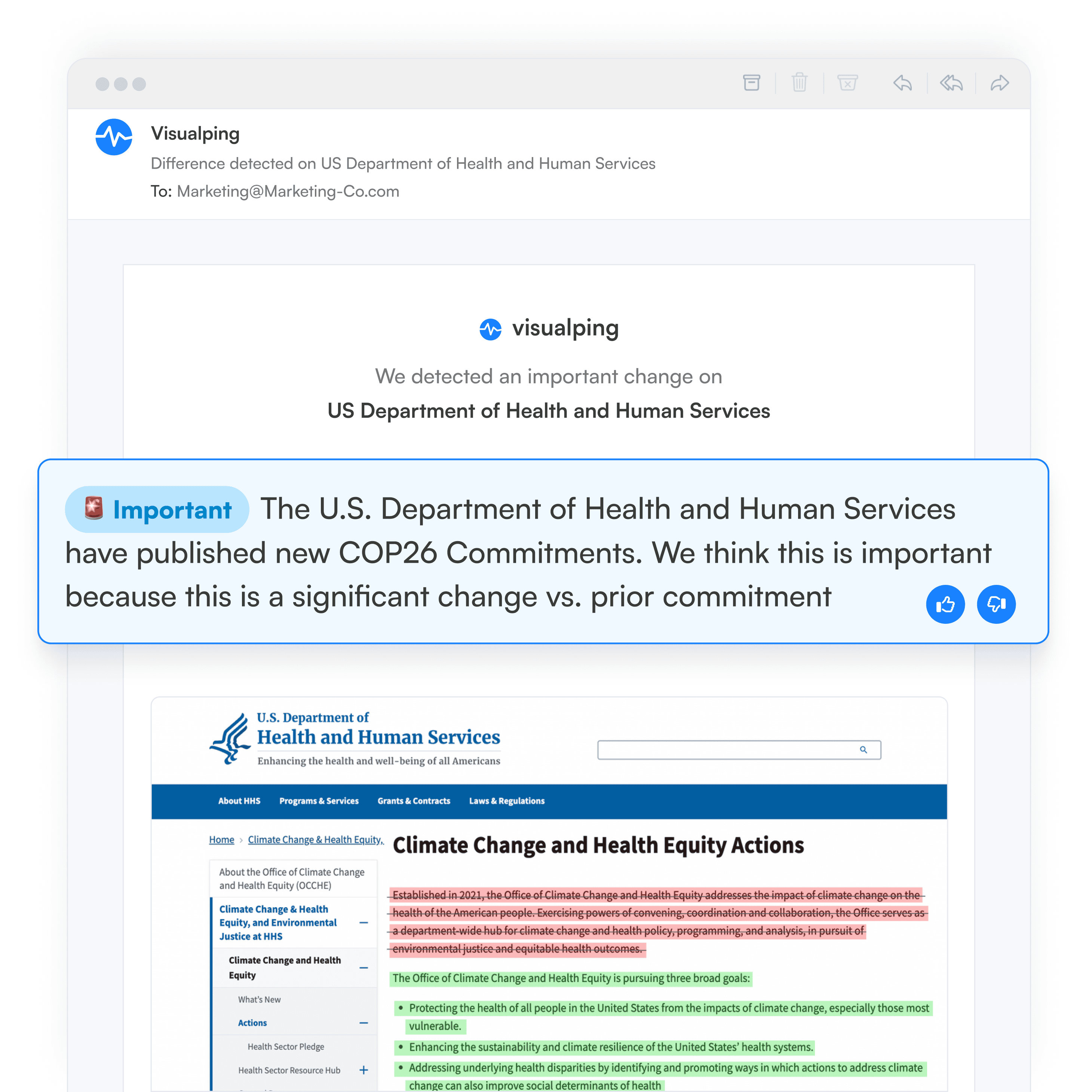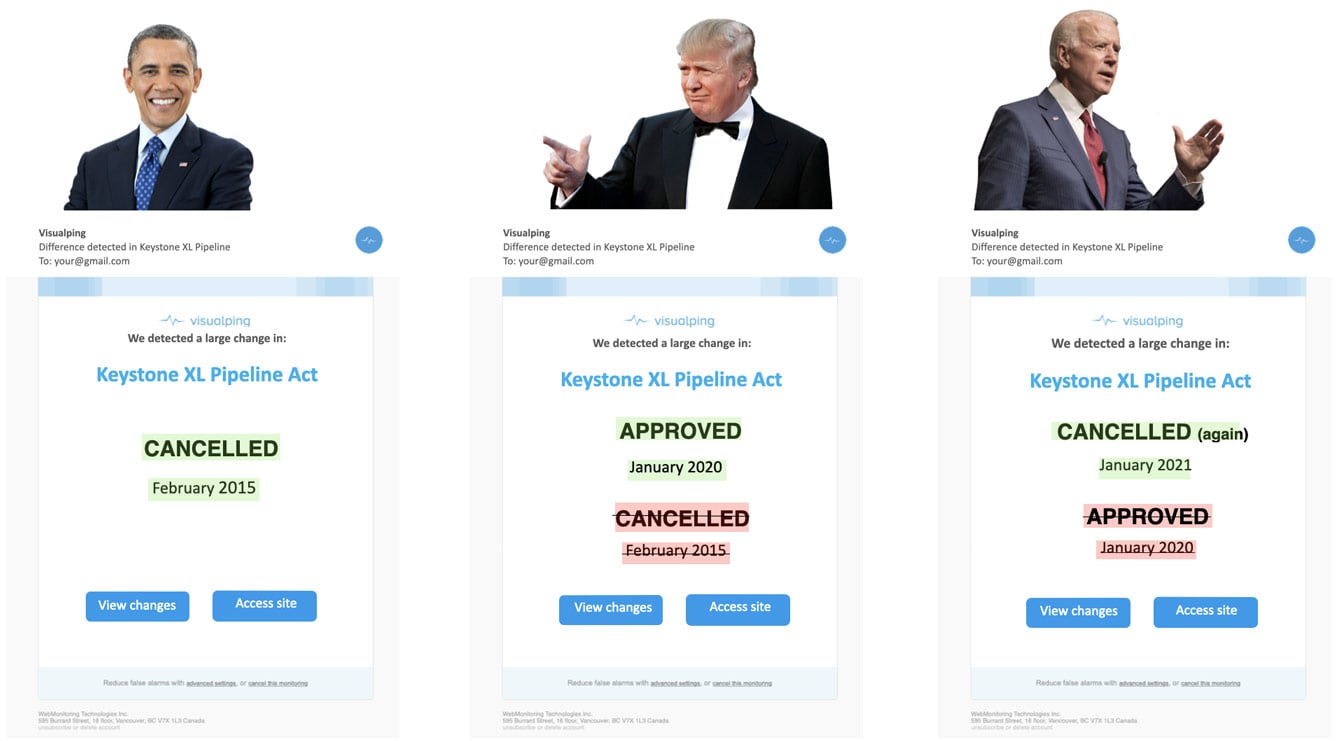What is Regulatory Intelligence and Compliance 2025?
By Emily Fenton
Updated December 11, 2024

Regulatory intelligence is the systematic process of collecting and analyzing the latest regulatory updates that impact an organization’s operations, in order to ensure compliance.
Website monitoring tools, like Visualping, help regulatory intelligence professionals get notified of relevant regulatory changes, making it easier to ensure your organization maintains its compliance.
What is Regulatory Intelligence?
“An organization’s ability to learn, and translate that learning into action rapidly, is the ultimate competitive advantage.”
That's Jack Welch, former CEO of General Electric. To understand the meaning of regulatory intelligence, you need to first distinguish between regulatory information and intelligence.
Regulatory Information vs Intelligence
Regulatory information is the raw private and publically available data that’s researched and monitored by various legal and regulatory professionals -- compliance teams, lawyers, research librians and knowledge management professionals, for instance.
Regulatory intelligence is active. It refers to the systematic process of collecting and analyzing the latest updates to regulatory requirements, policies, and guidelines that impact an organization’s operations.
It also includes the process of communicating the implications of that information to internal stakeholders, to ensure the organization maintains its compliance.
Legal and regulatory professionals need to continuously keep track of updates to regulatory expectatoins. On an ongoing basis, they perform impact analyses to make informed, up-to-date compliance strategies.
It's having a proactive approach, rather than reactive, by always staying up-to-date on the latest relevant requirements in your industry.
What are the Sources of Regulatory Intelligence?
Regulatory intelligence can come from many different sources -- namely, the internet. Some of the most common sources of regulatory intelligence are listed below.
- Regulatory agency websites
- Industry association websites
- Government agency newsletters
- Scientific literature
- Government agencies' social media
How to Stay on Top of the Latest Regulatory Requirements?
Visualping: Real-Time Regulatory Knowledge From Any Web Source
Regulatory monitoring tools, like Visualping, are a common and simple way for legal and compliance teams to keep track of relevant updates online.
Visualping automates the process of monitoring web pages from anywhere on the internet, and sends you an email alert when there's a change. Its AI features make it easier and more efficient to stay on top of legislative and regulatory changes.

The alerts include a screenshot of the page, with an AI-generated summary of the change, distilled in two to three lines. The alert also includes a screenshot of the page, with the changes highlighted.
Visualping can track any web pages on the internet. You can select the exact area of the page you care about, so you're only notified of relevant updates, and you can monitor web pages as frequently as every 5 minutes.
Regulatory tracking tools, Visualping, are increasingly used to help regulatory and compliance professionals keep track of changing expectations in their industry. These tools help you stay efficient -- while informed -- on everything from global clinical trials, the latest government requirements and resources, FDA approvals, compliance procedures, manufacturing requirements, advice personnel, and so on.
Why is Regulatory Intelligence Important?
Mitigating the Risk of Compliance
Professionals monitor regulatory changes to maintain compliance.
Regulatory compliance is when a company monitors and adheres to state, federal, and international laws and regulations as part of its operations. The requirements depend largely on the industry and company but, regardless, companies are legally required to comply with certain laws and regulations related to its operations.
Regulatory Intelligence: Monitor, Analyze and Action
Regulatory intelligence encompasses 3 components: monitoring, analysis and taking strategic action.
1. Monitoring Regulatory Changes
The first step is to monitor the regulatory climate for changes in law, policies and regulations the company needs to be aware of. Professionals conduct a breadth of research about regulatory norms as per a particular product in a particular geography.
But it’s an overwhelming list, the sources online to check for your research: newsletters, announcements, trend data, guidance documents, websites, consultation papers, FOI Requests, warning letters, regulatory emails and seminars and training sessions. The list goes on.

That’s why, to efficiently track information and be alerted of changes, regulatory professionals use various online regulatory intelligence and compliance tools to make the research and monitoring easier and quicker.
An example is website change detection tools, like Visualping.io. Visualping continuously crawls web pages for changes in regulatory information, and sends you real-time email alerts when regulatory changes occur. Instead of having to manually look up content for changes, Visualping automates the process of checking the content for you.
2. Analyzing Regulatory Information
The data then needs to be filtered and processed for relevancy, and analyzed for the latest trends and industry patterns.
Regulatory professionals play a crucial role in strategizing the development, approval and maintenance of company products, as well changes to regulations impacting the global regulatory landscape.

Effective regulatory intelligence encourages proper planning within various disciplines of the company, from manufacturing to marketing.
Some regulatory intelligence tools include features to help filter the data for relevance.
Visualping’s Keyword Alerts feature lets companies monitor web pages for certain keywords. Filter out the noise and receive email alerts page changes that only contain keywords of interest.
The information usually goes through various modifications to filter out irrelevant data and screen out the actionable items.
3. Synthesizing for Actionable Items
This is the output stage of regulatory intelligence. Often a matter of internal dialog within the company, regulatory intelligence and compliance professionals need to determine the most appropriate and practical strategy for the company.
Different products have different regulatory guidelines in different countries. Experts need to propose a plan of action that outlines how the business will effectively respond to shifts in the regulatory climate for the target distribution markets.
As regulatory norms continue to evolve over time, strategizing effective responses is a continuous and ever-changing process.
Why You need Regulatory Intelligence and Compliance Tools
Regulatory intelligence quickly becomes tedious and complex. It’s not just challenging to follow shifting laws, policies and regulations in targeted sectors, but identifying the most practical and efficient strategies, as well.

To easily and efficiently track information and be alerted of changes, regulatory professionals use online tools, like Visualping, to automate the monitoring process and be alerted of changes, as opposed to manually checking themselves.
Visualping assists many law and consultancy firms, for example, responsible for monitoring the regulatory climate to quickly and strategically support their clients.
Users can adjust their monitoring to specifically track textual changes, like changes to Terms and Conditions Agreements (T&Cs). Users can also monitor visual page elements, PDFs, and check web pages as often as 5 minutes.
But as well as regulatory intelligence, businesses also use Visualping as a competitive monitoring tool, to produce competitive intelligence. For more on this, check out our blog post what is competitive intelligence?.
Visualping offers several individual and business subscription plans for high frequency monitoring.
Conclusion
Regulatory intelligence is the act of gathering and analyzing regulatory information, communicating its implications and synthesizing the data into actionable items for the company.
Regulatory compliance is when professionals adhere to shifting state, federal, and international laws and regulations as part of its operations.
But keeping up with the data is challenging, and extensive research and analysis demands both time and resources.
For more information about Visualping as a regulatory intelligence and compliance tool, contact us at sales@visualping.io.
Get regulatory updates -- straight from the source.
Sign up with Visualping to get alerted of regulatory changes from anywhere online.
Emily Fenton
Emily is the Product Marketing Manager at Visualping. She has a degree in English Literature and a Masters in Management. When she’s not researching and writing about all things Visualping, she loves exploring new restaurants, playing guitar and petting her cats.